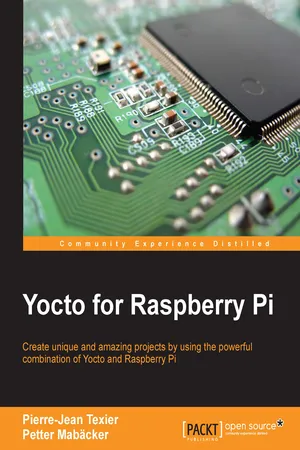
- 214 pages
- English
- ePUB (mobile friendly)
- Available on iOS & Android
Yocto for Raspberry Pi
About This Book
Create unique and amazing projects by using the powerful combination of Yocto and Raspberry Pi
About This Book
- Set up and configure the Yocto Project efficiently with Raspberry Pi
- Deploy multimedia applications from existing Yocto/OE layers
- An easy-to-follow guide to utilize your custom recipes on your Raspberry Pi
Who This Book Is For
If you are a student or a developer of embedded software, embedded Linux engineer or embedded systems in competence with Raspberry Pi and want to discover the Yocto Project, then this book is for you. Experience with Yocto is not needed.
What You Will Learn
- Explore the basic concept of Yocto's build system and how it is organized in order to use it efficiently with Raspberry Pi
- Generate your first image with Yocto for the Raspberry Pi
- Understand how to customize your Linux kernel within the Yocto Project
- Customize your image in order to integrate your own applications
- Write your own recipes for your graphical applications
- Integrate a custom layer for the Raspberry Pi
In Detail
The Yocto Project is a Linux Foundation workgroup, which produces tools (SDK) and processes (configuration, compilation, installation) that will enable the creation of Linux distributions for embedded software, independent of the architecture of embedded software (Raspberry Pi, i.MX6, and so on). It is a powerful build system that allows you to master your personal or professional development.
This book presents you with the configuration of the Yocto Framework for the Raspberry Pi, allowing you to create amazing and innovative projects using the Yocto/OpenEmbedded eco-system. It starts with the basic introduction of Yocto's build system, and takes you through the setup and deployment steps for Yocto. It then helps you to develop an understanding of Bitbake (the task scheduler), and learn how to create a basic recipe through a GPIO application example. You can then explore the different types of Yocto recipe elements (LICENSE, FILES, SRC_URI, and so on). Next, you will learn how to customize existing recipes in Yocto/OE layers and add layers to your custom environment (qt5 for example).
Style and approach
A step by step guide covering the fundamentals to create amazing new projects with Raspberry Pi and Yocto.
Frequently asked questions
Information
Yocto for Raspberry Pi
Yocto for Raspberry Pi
Credits
| Authors Pierre-Jean TEXIER Petter Mabäcker | Copy Editor Madhusudan Uchil |
| Reviewers Burt Janz Dave (Jing) Tian Helmi ROMDHANI Pierre FICHEUX | Project Coordinator Judie Jose |
| Commissioning Editor Amarabha Banerjee | Proofreader Safis Editing |
| Acquisition Editor Meeta Rajani | Indexer Hemangini Bari |
| Content Development Editor Rashmi Suvarna | Production Coordinator Shantanu N. Zagade |
| Technical Editor Mohit Hassija | Cover Work Shantanu N. Zagade |
About the Authors
Firstly, I want to thank my patient wife for her support during my writing sessions. I also give thanks my parents and my brother; without them, this book possibly would not have happened.I would also like to thank all of the mentors that I’ve had over the years—mentors such as Cyril SAGONERO, Sylvain LE HENAFF, Pierre BORDELAIS, Vincent POULAILLEAU, Fabrice BONNET, Jean-Claude PERESSINOTTO, and Pierre AUBRY. Without learning from these teachers, there is not a chance I could be doing what I do today.To finish, I would like to thank Eric MOTTAY, the CEO of Amplitude Systèmes; Luca TESTA, the head of the electronics team at Amplitude Systèmes for his trust; and Hitesham WOODHOO, Alexandre GAMONET, Kevin PINTO, and Guillaume MACHINET for all the discussions about the Raspberry Pi during coffee breaks.
About the Reviewers
Table of contents
- Yocto for Raspberry Pi